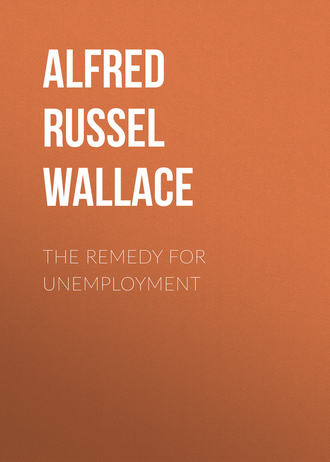
Alfred Russel Wallace
The Remedy for Unemployment
The farmers and labourers, as well as mechanics or others, who might be living upon the land thus taken over, would have the option of remaining upon it in the capacities for which they were severally fitted, as superintendents, foremen, or labourers; or if they preferred to leave would receive a reasonable “compensation for disturbance.”
There are always people who will not be satisfied with any proposed remedy for a great evil unless it deals with every possible phase and form of it, so as to abolish it completely at once, and for ever. Some of these will be sure to object that the worst of the unemployed—the tramps and the men who will not work under any conditions—will still remain; and they will ask triumphantly: “How will you bring these into your system? They will flock into your colonies in winter to enjoy the good living and do nothing to earn it.” There are two replies to this objection, which is really no valid objection at all. In the first place, it was not for this class of men that the “Unemployed Workmen Bill” was brought into Parliament, or for whom legislation has been promised by the Government. It was not of these unfortunates that either Socialists or Liberals drew such vivid pictures of undeserved misery, but of the genuine workmen, the men or women whose one object in life is to obtain work, however hard, however it may injure their own health or shorten their lives, in order that they may save their families from starvation, or from the deservedly hated workhouse. The whole of this great and successful agitation has been in behalf of those willing and anxious to work, but to whom by our actual social organisation it is forbidden. It was for them only that the “Right to Work” was demanded—not the right to food while refusing to work. It is a sufficient reply to the objectors, therefore, that Mr. Mills’ proposal really solves the problem as regards those very classes of workers for whom the “Right to Work” clause was drawn.
But, secondly, it is certain that the system of co-operative colonies here explained would, in the course of a few years, absorb also the so-called unemployable, who are in reality by no means numerous, and have never yet been offered the kindly assistance, the sympathetic treatment, the amount of liberty and the congenial surroundings they would find in these colonies. General Booth’s experience at his Essex colony has shown that a considerable proportion of these men are easily reclaimable, and the system there is far less favourable and less educational than it would be in our proposed co-operative colonies.
Before concluding, I will briefly advert to a few matters of high public importance, involving great cost, much loss of time and energy, widespread physical and moral deterioration, and terrible sacrifice of life, which would all be ameliorated and would ultimately disappear in proportion as these co-operative colonies spread over the country.
First and foremost, the cost of Old Age Pensions, which all admit to be absolutely necessary now, would steadily diminish with increase of these colonies, and ultimately become unnecessary. Next, the terrible mortality of infants, due to our present competitive manufacturing system, would rapidly disappear when the health and comfort of mothers were thoroughly safeguarded as a primary social duty. What would be the result of such a natural, simple, healthful, yet fully-occupied life as would prevail in these colonies may be judged by the condition of some of the German colonists in Central Brazil. A young friend of mine is now living among them. They subsist almost entirely on the direct produce of their own labour; they have large and healthy families, and his two nearest neighbours have twelve and eight children respectively, mostly grown up, without having lost a single child.
Then there is the enormous and ever-increasing system of inspectorship of factories and workshops, to guard against dangers of machinery, unhealthiness, and overwork, all quite unnecessary, and which would never even be thought of where there was no one to profit by such enormities.
Lastly, there is the curse of adulteration, ever increasing, pervading all commercial products, clothing, food, and even drugs, injurious alike to the health and the morality of the nation, and which inspectors and penalties have hardly any effect upon. All this would absolutely disappear when everything now adulterated would be produced in these colonies for home consumption, and not for the profit of capitalists; and this fact would certainly re-act upon the private manufacturers. The safety and healthiness of all the co-operative shops would soon compel private capitalists to improve the conditions of their factories under the penalty of not being able to obtain men or women to work for them.
A collateral but highly beneficial result of the system here advocated is, that just as it extended and flourished, it would, by absorbing all surplus labour, raise the standard of wages over the whole country, and of itself produce that “minimum wage” that we may decree by law, but which, so long as our present system persists unchecked, we can certainly never enforce. The generally higher wages thus caused will almost all be spent on home-made products, and thus more than compensate for any diminution of foreign trade that may occur: for it must always be remembered that foreign trade is mainly carried on for the profit of the capitalist or to supply luxuries for the wealthy, and is little needed when all workers are enabled to produce the necessaries of life, co-operatively, for themselves.
Yet another important economy not yet referred to arises from the essential nature of a co-operative community producing everything for their own consumption, and therefore absolutely free from the faintest suspicion of adulteration. We have seen that Mr. Mills estimated that not more than one-fifth of the total produce would have to be sold in order to purchase articles or materials which the colonists could not produce themselves. Each colony would decide, or rather would find by experience, which articles it would thus produce in larger amounts than it needed—one might sell butter, cheese, and perhaps cream; another woollen fabrics; another shoes, etc., or some combination of these. But it would soon become known that everything made at the colony was genuine. The butter would not be margarine; the cloths and flannels would be wool throughout, the boot-soles would not be of brown paper; and the matches, the china-glazes and the paints would all be made of non-poisonous materials. The certainty that this would be so—everything being made primarily for use and not for profit—would ensure a large and constant demand for everything the colonists had to sell. They would thus be saved all the costs of advertising or of taking their goods to market; as was found to be the case with the best of the Communistic Societies in the United States, whose garden and farm seeds, dried and preserved fruits, tubs, washing machines, traps, and chairs, are still widely known and sought after for their purity and good workmanship.
All the goods which the colony had for sale would thus bring the highest market prices with the minimum expenditure of time and labour; so that one fatal circumstance that caused the failure of so many attempts at co-operative workshops—the difficulty or impossibility of selling the produce—would never arise.
The result of this brief, but I believe accurate, examination of the capitalistic and the co-operative systems in their essential conditions and proved results, is to show that the former is inherently wasteful to an enormous degree, and so productive of physical and moral evil as to be incompatible with a true civilisation. In every part of the world it is alike productive of poverty, degradation, and crime for large numbers of the workers, and the latter perhaps in an equal proportion (though in different ways) for the capitalist employers also. Such a system stands condemned at the bar of reason, justice, and common sense.
I think I have now shown that the way to solve this great “Problem of the Unemployed” was clearly pointed out nearly twenty years ago, with precision, fulness of detail, and sufficient basis of fact and experience. But the time had not then come. The few read and appreciated the book, but it was generally ignored, with the usual cry of “Utopian”! Now, however, the hour has arrived, and here is the Man whose long-neglected book shows us clearly the lines on which alone we can successfully overcome the difficulty.
But a proviso has here to be made, which is of the most vital importance and which must always be kept in view. Even if the scheme here advocated is carried out to the letter, so far as its methods are concerned, complete success will only be attained if its organisers are imbued throughout with the human, the philanthropic, the brotherly spirit of the propounder. This will depend almost wholly on the choice of men for directors of the several co-operative colonies. If the head is chosen for his supposed power of managing and governing large bodies of men, in the way our governors of prisons and masters of workhouses have been chosen; and if he enters on his duties with the one idea of compelling all to work alike, from the very first, and with that end draws up an elaborate system of rules, with fines and punishments to be rigidly enforced in the various departments of industry, then failure will be inevitable. Neither is the successful manager of a great factory or large estate more likely to succeed if he is a man who looks upon workers as mere “hands”—as parts of a great productive machine, each to be kept in his proper place, and to have no will of his own.






